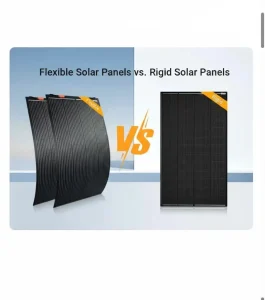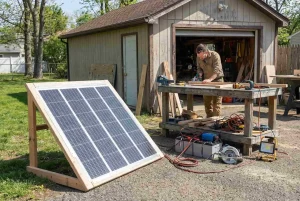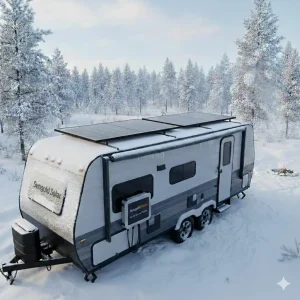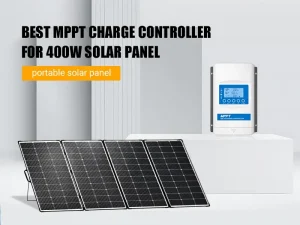Table of Contents
As we all know, the market for solar energy as one of the renewable energy sources is vast.
According to the IEA study, solar PV accounted for three-quarters of global renewable energy capacity additions in 2023. Installed solar PV capacity is expected to surpass coal as the world’s largest by 2027.
As retail electricity prices rise, policy support to help consumers save money on their electricity bills is increasing. Distributed solar PV (e.g., wall solar, rooftop solar, balcony solar panels) will also grow faster.
The advantages of solar energy are also becoming more apparent in off-grid areas such as caravanning and camping. Many caravan owners use flexible solar panels for caravans to power appliances and equipment. Wherever we go, it feels like a real home.
In addition to flexible solar panels, RV portable solar panels are also a must-have energy system for owners.
In this blog, Sungold will delve into portable solar panels for RVs. What is a portable RV solar panel? How much solar do I need for my RV? What are the Best solar panels for RV? Let’s find out!
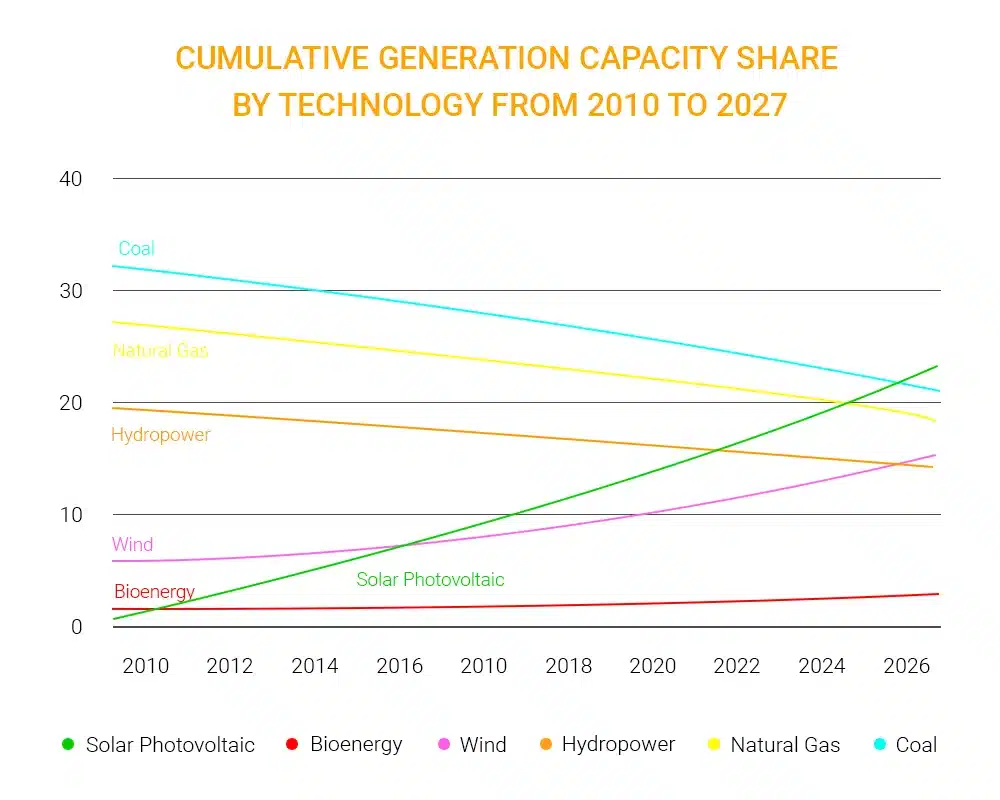
What are portable RV solar panels?
Types of solar panels
The more common solar panels on the market today fall into three main categories:
- Monocrystalline silicon solar panels
- Polycrystalline solar panels
- Amorphous silicon solar panels
Monocrystalline silicon photovoltaic modules are solar panels made of high-purity monocrystalline silicon, which are now widely used in the photovoltaic market.
Monocrystalline silicon photovoltaic modules have the highest photoelectric conversion rate, in which the photoelectric conversion efficiency monocrystalline silicon > polycrystalline silicon, polycrystalline silicon > amorphous silicon.
Most car owners use monocrystalline silicon solar panels. Most home solar panels also use monocrystalline silicon.
Portable solar kit for RV
Portable solar kits for RVs are different from installing solar panels on the roof of your RV. Flexible solar panels are mounted on the roof of your caravan, whereas portable solar panels for RV are portable, mobile, and can be stored in your caravan when not in use.
If you want to charge your mobile phone or laptop while camping in your RV solar panel kits are a good choice.
Why choose portable solar panels for RV?
Advantages of RV portable solar panels
Portable
One of the great things about portable RV solar panels is that they can always be moved to where the light is strongest.
As the sun moves, the panels can easily move and follow it, maximizing the efficiency of capturing solar energy.
When the weather is hot, you can park your RV in the shade while placing your portable solar panels for RVs in the sun. This is very convenient and gives you a better sense of usage.
No Installation Required
Unlike flexible solar panels, a portable solar kit for RV doesn’t need to be installed – just place them in the sun and connect them.
It doesn’t need to be drilled into the top of the caravan to be installed, and there’s no need to climb up on the roof.
Direct charging
Some portable solar panels for campers have built-in USB ports that allow the portable panels to charge devices directly. This is handy for charging a mobile phone or tablet, but the panels can also charge your caravan battery pack.
Compatible with Portable Power Station
Sungold portable solar panels are compatible with all types of portable power plants (a portable device containing a battery for storing electricity and usually a small inverter for powering a 120V AC outlet) on the market.
The combination of the two is a small portable solar system.
Many people traveling in RVs purchase portable solar plants and portable solar panels rather than installing an entire electrical system.
The solar panels receive energy and store it in the solar power station.
This portable power station can charge many devices and appliances such as laptops, small gaming devices, lights, televisions, and small 12V refrigerators.
A larger capacity solar generator can run more power-hungry devices such as hair dryers, microwaves, and other larger devices.
Disadvantages of portable solar panels for camper
- It takes up space in the car, especially for panels over 200W
- Cannot be charged while driving
- Needs to be unfolded each time it is used
Know the pros and cons of portable solar panels to help you make the best decision. Choose the best product for your needs.
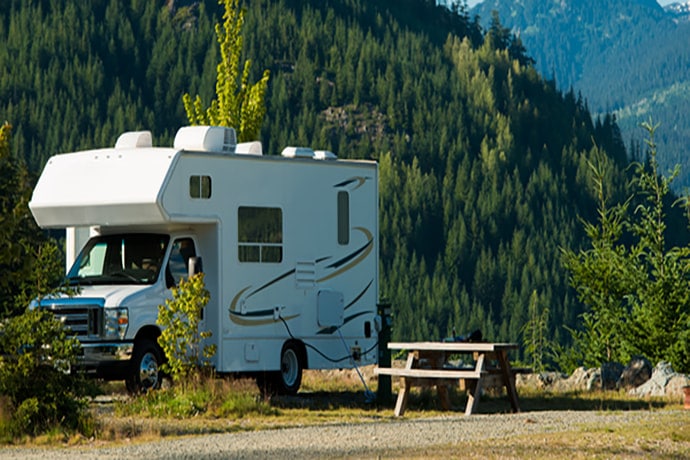
How much solar do I need for my RV?
The number of solar panels you need for your caravan depends on a number of factors, such as the solar peak sunlight hours at your location, the power consumption of your appliances, and the output of your solar panels.
Peak sunlight hours
Peak sunlight hours measure the amount of sunlight a particular location receives. A single peak sunshine duration is reached when the sun’s intensity averages 1,000 watts per square meter of photovoltaic power.
Knowing the Peak Insolation Time can help you estimate the amount of sunlight a location is expected to receive each day and the amount of electricity it is expected to generate.
Caravan solar panels typically capture between 100 and 400 watts of solar energy during peak sunlight hours.
Electrical power consumption
Your total daily power consumption will determine the number of solar panels you need.
The best way to determine how many solar panels your RV needs is to calculate the wattage requirements of your appliances. Wattage refers to the power consumption of an appliance.
You can usually find the wattage value marked on the appliance. The starting wattage of the appliance refers to the maximum amount of power that the appliance needs to withstand when it starts. The power rating refers to the power required for the appliance to operate normally.
In the table below the starting and running watts of some appliances are summarised.
Electrical Appliances | Running Wattage | Starting Wattage |
Electric frying pan | 1300 | 0 |
Dishwasher (cold dry) | 700 | 1400 |
Washing machine | 1150 | 2300 |
Fridge/freezer | 700 | 2200 |
Light bulbs | 60-75 | 0 |
Microwave oven | 625 | 0 |
Toaster | 900 | 0 |
Coffee maker | 1750 | 0 |
Blender | 300 | 800 |
Iron | 1500 | 0 |
Dryers | 5400 | 7000 |
Oven | 1200 | 0 |
Curling iron | 1500 | 0 |
Colour television | 300 | 0 |
Laptop | 200-250 | 0 |
Converting Volts/Amps to Watts. If the appliance is rated in Volts or Amps, you can use the following formula to calculate the appliance’s operating wattage:
Volts (V) x Amps (A) = Watts (W)
Also, add up the operating watts of the devices you use and calculate if they total more than the operating watts listed on the solar generator. If so, you should consider purchasing a generator with a higher output capacity.
Factor in starting wattage requirements. Specify the maximum starting wattage of the equipment and whether the running wattage total can include the maximum starting wattage.
If not, add the maximum starting watts. This will ensure that there is enough power available to drive the equipment.
The final number adds up to the total watts the generator needs to carry.
As mentioned above, to avoid overloading the generator, do not exceed its wattage rating. (Generator overload: the actual wattage of the motor exceeds the wattage rating.)
Solar Panel Output
Finally, you need to know the efficiency of the solar panel’s power generation. A 400 watt solar panel will provide approximately 400 watts per hour under peak sunlight.
Assuming 6 hours of peak sunlight, the solar panel will generate 2400 watts per day.
If your daily energy consumption is 5000 watts, you will need at least two 400W solar panels to power your caravan’s appliances and equipment.
It’s worth noting that you’re unlikely to get 6 hours of peak sunlight daily, which is ideal.
Other environmental factors (e.g. temperature, shadows) will also affect the efficiency of the solar panels in generating electricity.
Solar panels can still collect energy on cloudy and rainy days, it’s just that their output will be reduced and they will be less efficient.
How to connect solar panels for RV?
You might be worried that connecting portable solar panels for RV is very complicated, but it’s not. Learn more below:
Mobile solar panels cannot be connected directly to the battery. The solar panel will apply too much voltage and/or current to the battery, which may eventually overcharge and damage the battery.
This is where a solar charge controller is needed. The purpose of a solar charge controller is to regulate the voltage and current from the solar panel to the battery to provide the proper charge cycles, voltage, and current to safely charge the battery.
Portable RV solar panels typically have MC4 connectors (or similar solar panel connectors) that can be very easily connected to a charge controller.
So, to connect a portable solar panel to a caravan, you need to connect the solar panel to a solar charge controller. The charge controller in turn connects to the RV’s 12V house battery/battery pack.
Your portable solar panel will now charge your battery.
The solar panel you see mounted on the roof of your caravan is very similar, the difference being that it can be moved from place to place and stored in your caravan when traveling and not in use.
There are also solar panels on the market that can charge appliances directly, usually with a USB port built into the panel or paired with a solar cable that can connect directly to the device.
Another option is to use a portable power station, where the solar panels are connected to a portable power station via a cable. The energy is stored in an energy storage for use at night.
3 best solar panels for RV
Sungold Solar is the world’s leading manufacturer of solar panels, providing one-stop solar solutions with 16 years of manufacturing experience.
The following 3 best solar panels for RV are time-tested and customer-affirmed.
Hi-Power series high efficiency solar panels
Sungold high efficiency 4*100W camping solar panels are suitable for large-scale power plants of 1-2.5kWh. It adopts the innovative PERC stacked-watt cell welding technology, which gives it a unique appearance.
In addition, Sungold offers adapted cables to fit small Anderson, DC, and MC4 interfaces to ensure ease of use.
It is available in different sizes and specifications, 100W-440W, and so on. The output is highly efficient and lightweight. You can also customize the size according to your needs.
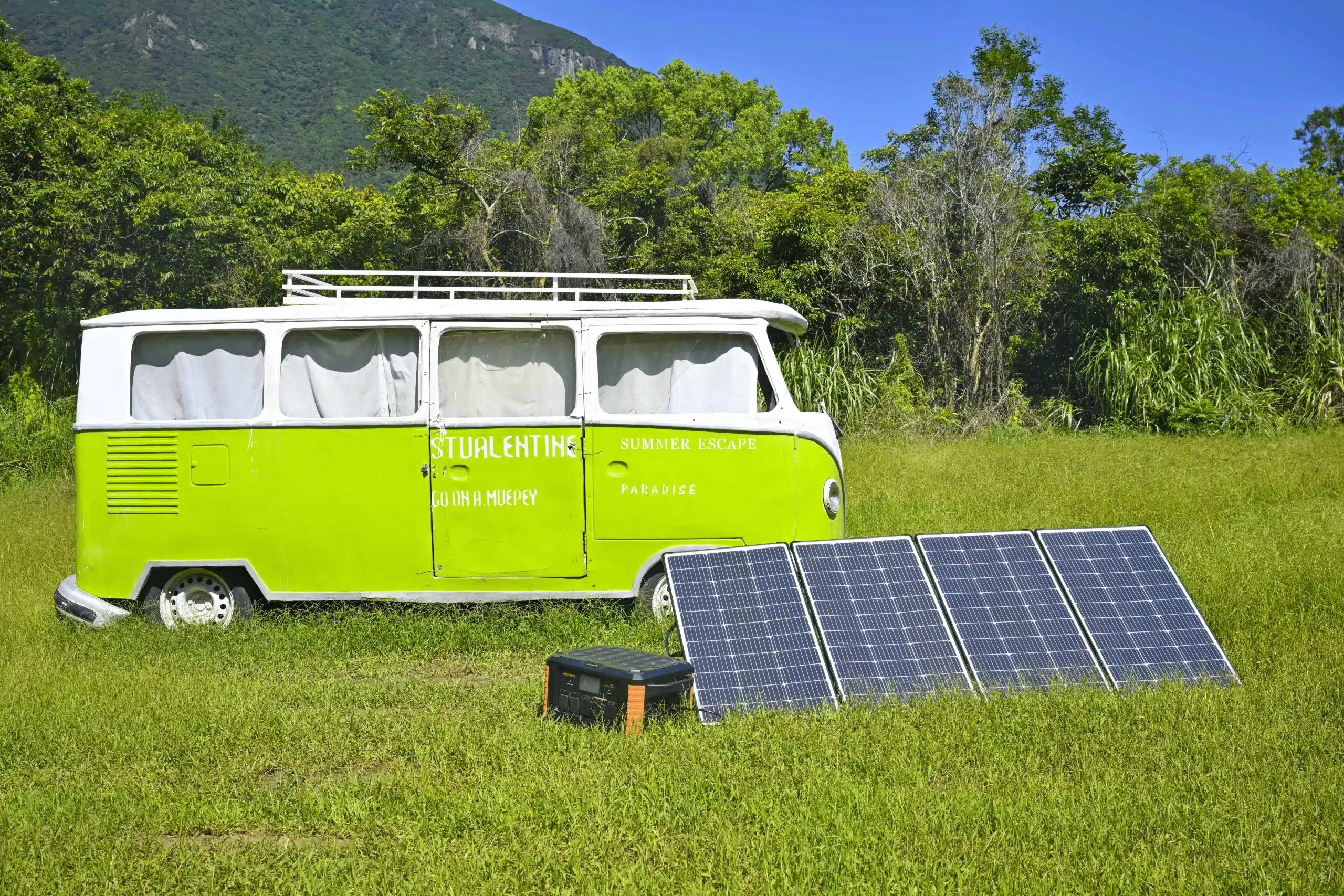
Winner bag series handheld fabric sewing bag
Lightweight and compact, this Winner bag solar panel is easy to carry wherever you go.
The aesthetically pleasing panel and ergonomic handle design take only 60 seconds to set up, making it perfect for outdoor use.
The eco-friendly, non-polluting, foldable panels are quick to set up, easy to transport, and power a solar power system.
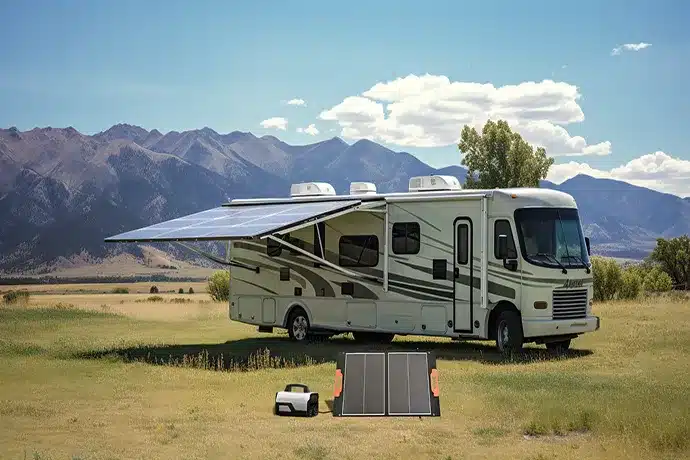
SPC Series Portable Charging Kits
The new generation of portable fabric-sealed SPC Series is designed to withstand the rigors of caravanning. It has a sturdy stand that can be easily angled to maximize solar capture.
These suitcase solar panels are compatible with most 12V solar generators and batteries (Jackery, Goal Zero, Blutti, ecoflow, etc.).
Explore Sungold solar panels for RV adventures for a superior RV experience.

Final Thoughts
According to the Renewables 2023 report, global renewable energy capacity is expected to reach 7,300 GW by 2028 under current policy and market conditions.
The role of solar energy in this wave of renewable energy is self-evident.
RV portable solar panels are the ideal energy solution for outdoor camping and off-grid environments.
Let’s join the RV portable solar panels and usher in a cleaner, more independent, and sustainable energy future.


